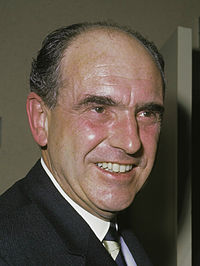More languages
More actions
Andreas Papandreou Ανδρέας Παπανδρέου | |
|---|---|
 | |
| Born | 5 February 1919 Chios, Greece |
| Died | 23 June 1996 Ekali, Greece |
| Nationality | Greek |
| Political orientation | Social democracy Democratic socialism (alleged by some) |
| Political party | PASOK |
Andreas Papandreou was a Greek politician who served as the Prime Minister of Greece from 1981 to 1989 and again from 1993 to 1996.
Prime Minister of Greece[edit | edit source]
Economic Policy[edit | edit source]
During his first tenure, Papandreou nationalized some enterprises. [1]
Papandreou's economic policies resulted in inflation dropping to 13,1% in June 1989 from 24,2% in October 1981.[2]
The per capita income in US dollars increased by 5.2% from 1981 to 1989, from 13,443$ in 1981 to 14,148$ in 1989. [3]
During his final 1993 - 1996 tenure, inflation dropped from 14,4% in 1993 to 8,2% in 1996. [4]
Social Policy[edit | edit source]
Papandreou established the National Health System, which is regarded as PASOK's best governmental action, even as of today.
He also allowed EAM activists to return in Greece and receive special pensions, while many of their secret service folders were passed to the civilian administration. The purpose of this was to repatriate many Greek war refugees as well. [5]
The Woman Association of Greece also got strengthened.
Finally, the police state Greece had got reduced, as the Gendarmerie, and the City Police got merged and formed today's Hellenic Police, whereas the Central Information Service got disbanded and reformed into the present-day National Information Service. [6]
However, he also contributed to the de-industrialization of Greece and its 2009 financial crisis.[citation needed] PASOK also subjugated the trade unions that existed during that time.[7]
Foreign Policy[edit | edit source]
Papandreou, in his 1981 campaign, used the slogans "Out of NATO", "Out of EEC", "EEC, the pit of lions" and "EEC and NATO, the same syndicate". However, Greece never exited either organization. Instead, Statesian bases remained in Greece, while PASOK also stated that Greece shouldn't exit the EEC.[7] Later, during the time when Bill Clinton was the US President, Papandeou also expressed the will to cooperate with him.[7]
He pushed for some better terms for Greece and other South European countries regarding their staying in the EEC, some of which got accepted,[8] with then Neoliberal Prime Minister of the UK Margaret Thatcher said about him: [9]
"I never liked him, but he never left any EEC summit without getting something for his country"
He supported a two-state solution in the "Israeli" - Palestinian conflict and he had a close relation with PLO leader Yasser Arafat. He also praised anti-imperialist leaders Idi Amin of Uganda and Muammar Gaddafi of the Libyan Arab Jamahiriya. More specifically, during an interview in 1977, he said about Amin: [10]
He fights against the metropolitan centers of the West and he himself is their target. That alone puts him, in the worldwide chess board, in the place of anti-imperialist powers.
About Gaddafi, he said: [11]
Libya isn't a military dictatorship. In fact, it's the opposite. It is a government in the model of the Ancient Athenian democracy.
He also denounced the anti-communist leader of the Polish organization Solidarity, Lech Wałęsa and supported Wojciech Jaruzelski instead, possibly to appease the communists. [12] In a meeting there, he said:
Since the USSR is not a capitalist country, one cannot label it an imperialist power. The Soviet Union represents a factor that restricts the expansion of capitalism and its imperialistic aims.
References[edit | edit source]
- ↑ Προβόπουλος, Γεώργιος (1985). Οι δημόσιες επιχειρήσεις και οργανισμοί.. Athens: IOBE.
- ↑ Πάνος Καζάκος (2000). Ιστορία του Ελληνικού Έθνους: 'Παροχές και λιτότητα: η οικονομία στη δεκαετία του 1980' (pp. 364-371). Athens: Εκδοτική Αθηνών.
- ↑ International Macroeconomic Data Set.
- ↑ National Statistic Authority of Greece.
- ↑ Τζούκας, Βαγγέλης· Παναγιωτόπουλος, Π. (2010). Η αναγνώριση της Εθνικής Αντίστασης. Athens: Το Πέρασμα. ISBN 978-960-98310-8-6
- ↑ Βαμβακάς, Β.. "Η Ελλάδα στη δεκαετία του 80: κοινωνικό, πολιτικό και πολιτισμικό λεξικό"
- ↑ 7.0 7.1 7.2 "Ο Ανδρέας «απαντά» στον Αλέξη (κι ένα υστερόγραφο του Τσε…)". Ημερόδρομος.
- ↑ Archived from the original on 2006-07-17. Retrieved 2023-12-03.
- ↑ Νίκος Νικολάου (2008-01-26). "Αφηγησεις / Η κοινωνία και όχι η οικονομία, η προτεραιότητα του Ανδρέα" Καθημερινή. Archived from the original on 2012-11-17. Retrieved 2023-12-03.
- ↑ Συνέντευξη με τον Ανδρέα Παπανδρέου (1977-02-28). Τα Νέα.
- ↑ Robert D. Kaplan. Phantoms of the Balkans (p. 467).
- ↑ Gabriele, Simoncini (2003). National Minorities of Poland at the end of the Twentieth Century. The Polish Review. Polish Institute of Arts and Sciences in America..
